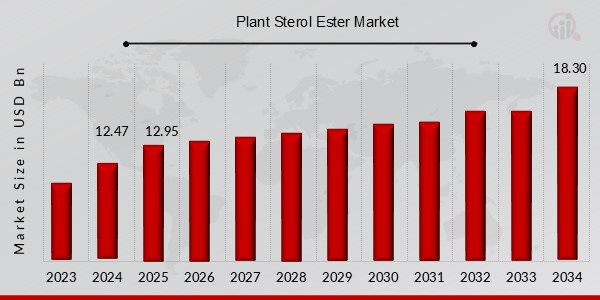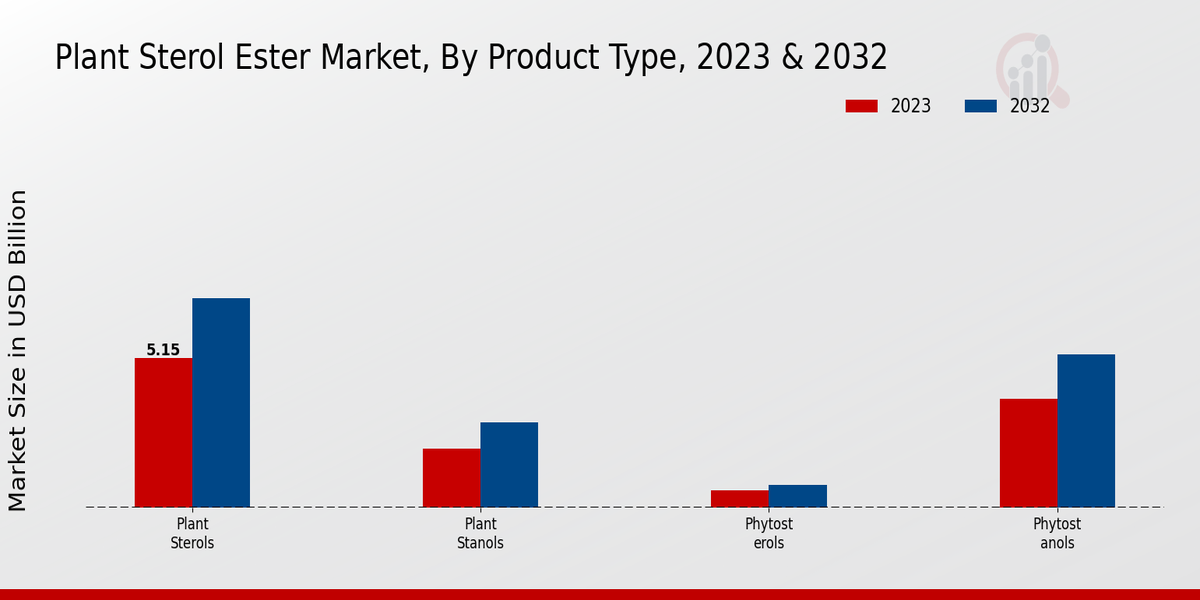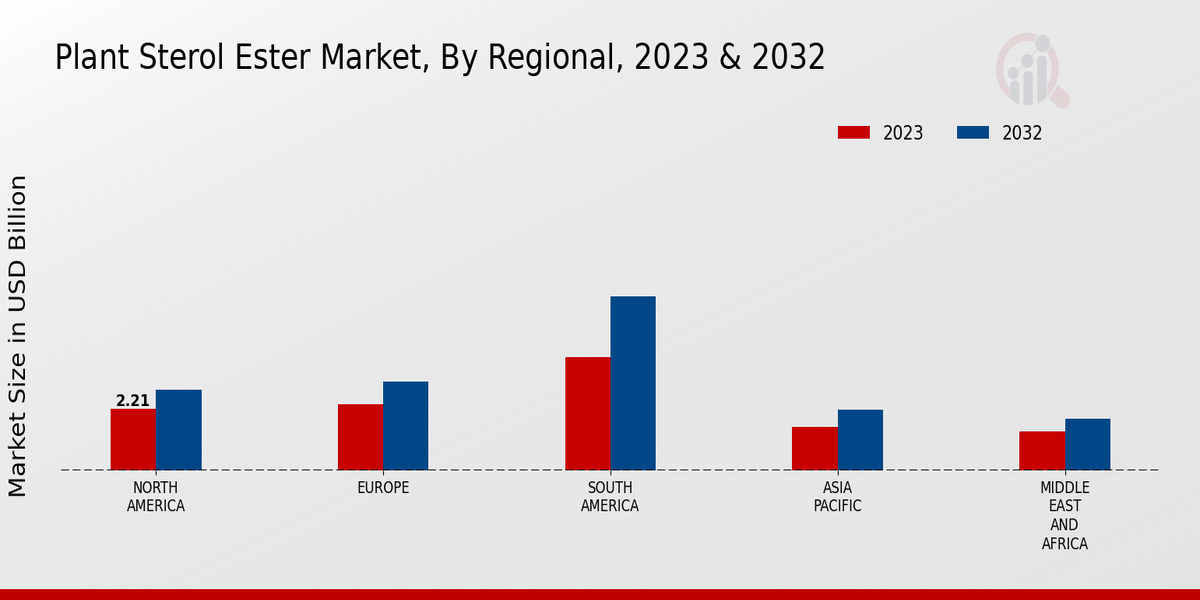Global Plant Sterol Ester Market Overview
The Plant Sterol Ester Market Size was estimated at 12.47(USD Billion) in 2024. The Plant Sterol Ester Market Industry is expected to grow from 12.95(USD Billion) in 2025 to 18.3(USD Billion) by 2034. The Plant Sterol Ester Market CAGR (growth rate) is expected to be around 3.90% during the forecast period (2025 - 2034).
Key Plant Sterol Ester Market Trends Highlighted
The Plant Sterol Ester market is bolstered by the increasing popularity of plant derived ingredients, owing to the growing knowledge regarding their nutritional value, especially their cholesterol and heart health properties. In addition, the increasing prevalence of functional foods and beverages is also helping the market expansion. With a rising inclination towards vegan and vegetarian eating habits, newer markets are being opened for the players in the plant sterol ester industry.
In the market, the last few years have been characterized by integrating new technologies with the aim of enhancing the effectiveness and absorption of plant sterol esters. In addition, partnerships between market players and research institutions are resulting in new applications and advantages of plant sterol esters. Plant based nutraceuticals are also supporting the market growth. This growth will largely be attributable to increasing health awareness and the rising consumption of plant-based products.

Source: Primary Research, Secondary Research, Market Research Future Database and Analyst Review
Plant Sterol Ester Market Drivers
-
Rising Health Consciousness and Demand for Functional Foods
Plant sterol esters are finding myriad uses in functional food items; as consumers are learning about the various health benefits of this ingredient, Unilever describes plant sterol esters as ingredients that can reduce cholesterol and heart disease risk and improve gut health. Numerous such functional foods continue to be developed, with food manufacturers adding plant sterol esters to items as varied as margarine, spreads, dairy products, and baked foods.The rising importance of such functional foods implies the potential for significant growth of the Plant Sterol Ester Market Industry over the next few years.
Increasing Prevalence of Cardiovascular Diseases
Cardiovascular diseases are among the major health concerns for the population worldwide, and plant sterol esters are found to be highly efficient in this anxiety type because of their ability to reduce the level of cholesterol in the blood and reduce the risk of heart diseases.
Modern tendencies in the sphere of public health prove the growth of concern about the necessity to solve the problem of cardiovascular diseases and probably that is why the demand for plant sterol esters is expected to grow.Thus, the Plant Sterol Ester Market Industry is expected to benefit from the timely reaction to the evident changes and tendencies related to the increasing awareness about the plant sterol esters’ health benefits and the growth of cardiovascular diseases as a highly serious health issue.
Government Regulations and Support for Healthier Food Products
Governments around the world are increasingly implementing regulations and policies to promote healthier food products. This includes encouraging the use of plant sterol esters in food products. For example, the US Food and Drug Administration (FDA) has approved the use of plant sterol esters in food products as a way to reduce cholesterol levels. The Plant Sterol Ester Market Industry is expected to benefit from government regulations and support for healthier food products.
Plant Sterol Ester Market Segment Insights
Plant Sterol Ester Market Product Type Insights
The Plant Sterol Ester Market is segmented by product type into plant sterols, plant stanols, phytosterols, and phytosterols. Among these product types, plant sterols held the largest market share in 2023, owing to their wide application in various industries such as food, pharmaceuticals, and cosmetics. Plant sterols are known for their ability to lower cholesterol levels and reduce the risk of cardiovascular diseases. They are also used as an additive in food products to enhance nutritional value.
Phytosterols, on the other hand, are gaining popularity due to their potential health benefits, including anti-inflammatory and antioxidant properties.The increasing demand for functional foods and dietary supplements is expected to drive the growth of the phytosterols segment in the coming years. The Plant Sterol Ester Market is expected to witness significant growth in the coming years, owing to the increasing awareness of the health benefits associated with plant sterols and phytosterols.
The rising prevalence of chronic diseases such as cardiovascular diseases and obesity is expected to drive the demand for plant-based ingredients that can help improve overall health and well-being.Additionally, the growing trend towards natural and organic products is expected to contribute to the growth of the plant sterol ester market. Overall, the Plant Sterol Ester Market is expected to continue to expand in the coming years, driven by the increasing demand for plant-based ingredients and the growing awareness of the health benefits associated with plant sterols and phytosterols.

Source: Primary Research, Secondary Research, Market Research Future Database and Analyst Review
Plant Sterol Ester Market Application Insights
The Plant Sterol Ester Market has been segmented under Application as Food Beverages, Cosmetics, Dietary Supplements, and Pharmaceuticals. The Food Beverages segment is projected to dominate the market, with an estimated revenue of USD 6.34 billion by 2024, mainly due to the increase in the trend of consumption of plant-based food products and functional beverages. Cosmetics is another important established segment due to the increasing demand for natural and organic skincare products.
The dietary Supplements segment is also expected to grow steadily as the use of plant sterol ester and the demand for health benefits become more popular.The Pharmaceuticals segment is emerging due to the development of new drug delivery systems and therapeutic applications. The insights into the segmentations are useful to the players in the field to come up with their strategies for offering products based on specific segments of customers.
Plant Sterol Ester Market Source Insights
The Plant Sterol Ester Market is segmented based on Source into Soybean, Canola, Corn, Wheat, and Others. Among these, Soybean is expected to hold the largest share of the market in 2023, with a market revenue of USD 4.83 Billion. The high demand for soybean sterols in various applications, such as food, beverages, and dietary supplements, is driving the growth of this segment. Canola is another significant source of plant sterol esters, with a market revenue of USD 2.61 Billion in 2023.
The increasing use of canola sterols in functional foods and nutraceuticals is contributing to the growth of this segment.Corn and wheat are also notable sources of plant sterol esters, with growing demand in the food and pharmaceutical industries. The market for plant sterol esters from these sources is expected to expand at a steady pace in the coming years.
Plant Sterol Ester Market Form Insights
The Plant Sterol Ester Market is segmented based on form into powder, liquid, and softgels. Among these, the powder segment is estimated to hold the largest market share in 2023, accounting for over 40% of the revenue. The powder form is preferred due to its ease of handling, storage, and transportation. It is also more cost-effective compared to other forms.
The liquid segment is projected to witness significant growth over the forecast period, owing to the increasing demand for plant sterol esters in functional beverages and dietary supplements.Soft gels are a convenient and easy-to-consume form of plant sterol esters, which is expected to drive their demand in the coming years.
Plant Sterol Ester Market End User Insights
The Plant Sterol Ester Market is segmented based on the end user into consumers, manufacturers, and health practitioners. Consumers are the largest segment of the market, accounting for over 50% of the revenue in 2023. The growth of this segment can be attributed to the increasing demand for plant-based products and the growing awareness of the health benefits associated with plant sterol esters. Manufacturers are also a significant segment of the market, accounting for over 25% of the revenue in 2023.
The growth of this segment can be attributed to the increasing demand for plant sterol esters in the food and beverage industry.Health practitioners are the smallest segment of the market, accounting for less than 10% of the revenue in 2023. The growth of this segment can be attributed to the increasing demand for plant sterol esters in the healthcare industry.
Plant Sterol Ester Market Regional Insights
The regional segmentation of the Plant Sterol Ester Market provides insights into the performance of the market across different geographic regions. North America, Europe, APAC, South America, and MEA are the key regions considered in this segmentation. North America holds a significant share of the Plant Sterol Ester Market, driven by increasing health consciousness and the rising prevalence of chronic diseases. The region has a well-established healthcare infrastructure and a large consumer base seeking natural and effective health solutions.Europe is another prominent region in the Plant Sterol Ester Market.
The region has a strong focus on preventive healthcare and is known for its high adoption of plant-based products. Increasing awareness about the benefits of plant sterols among consumers is driving the market growth in this region. APAC is a rapidly growing region in the Plant Sterol Ester Market. The rising disposable income and growing middle class in countries like China and India are contributing to the increased demand for plant sterol products.
Additionally, the growing awareness about the health benefits of plant sterols is fueling the market growth in this region.South America and MEA are emerging markets in the Plant Sterol Ester Market. The increasing health awareness and the growing demand for natural and healthy products are driving the market growth in these regions. However, the market penetration of plant sterols is still relatively low compared to other regions.

Source: Primary Research, Secondary Research, Market Research Future Database and Analyst Review
Plant Sterol Ester Market Key Players And Competitive Insights
Major players in the Plant Sterol Ester Market industry are constantly striving to gain a competitive edge by investing in research and development, expanding their product portfolios, and forming strategic partnerships. Leading Plant Sterol Ester Market players are focusing on developing innovative products that cater to the specific needs of their customers. They are also investing in expanding their presence by establishing new manufacturing facilities and distribution channels. The Plant Sterol Ester Market industry is characterized by intense competition, with major players adopting various strategies to increase their market share.
Some of the key competitive strategies include product differentiation, strategic alliances, and aggressive marketing campaigns.Archer Daniels Midland Company, a leading player in the Plant Sterol Ester Market, has a strong focus on research and development. The company has invested in developing a wide range of plant sterol ester products that meet the diverse needs of its customers. Archer Daniels Midland Company also has a presence, with manufacturing facilities and distribution channels in multiple countries.
The company's commitment to innovation and customer satisfaction has helped it maintain a strong position in the Plant Sterol Ester Market.BASF, a major competitor in the Plant Sterol Ester Market, has a strong focus on sustainability. The company has invested in developing eco-friendly plant sterol ester products that meet the growing demand for sustainable solutions. BASF also has a presence, with manufacturing facilities and distribution channels in multiple countries. The company's commitment to sustainability and innovation has helped it gain a competitive edge in the Plant Sterol Ester Market.
Key Companies in the Plant Sterol Ester Market Include
Plant Sterol Ester Market Industry Developments
Rising consumer awareness about the health benefits of plant sterol esters, such as their ability to lower cholesterol levels and improve heart health, is driving market growth. Additionally, the increasing demand for natural and organic ingredients in food products is contributing to the market's expansion. Key industry participants are focusing on product innovation and strategic partnerships to gain a competitive edge. For instance, in February 2023, Raisio, a leading provider of plant-based solutions, announced a partnership with DSM, a leader in nutrition and health, to develop and market plant sterol ester-based products for the food and beverage industry.
Such collaborations are expected to accelerate market growth in the coming years.
Plant Sterol Ester Market Segmentation Insights
-
Plant Sterol Ester Market Product Type Outlook
-
Plant Sterol Ester Market Application Outlook
-
Plant Sterol Ester Market Source Outlook
-
Plant Sterol Ester Market Form Outlook
-
Plant Sterol Ester Market End User Outlook
-
Plant Sterol Ester Market Regional Outlook
| Report Attribute/Metric |
Details |
| Market Size 2024 |
12.47(USD Billion) |
| Market Size 2025 |
12.95(USD Billion) |
| Market Size 2034 |
18.3(USD Billion) |
| Compound Annual Growth Rate (CAGR) |
3.90% (2025 - 2034) |
| Report Coverage |
Revenue Forecast, Competitive Landscape, Growth Factors, and Trends |
| Base Year |
2024 |
| Market Forecast Period |
2025 - 2034 |
| Historical Data |
2020 - 2024 |
| Market Forecast Units |
USD Billion |
| Key Companies Profiled |
Bunge Limited, Adani Wilmar Limited, IOI Corporation Berhad, Ruchi Soya Industries Limited, DuPont, Archer Daniels Midland Company, Sime Darby Berhad, Cargill, Fuji Oil Holdings Inc., BASF, AAK AB, Golden Agri-Resources Limited, Wilmar International, Nisshin OilliO Group, Ltd. |
| Segments Covered |
Product Type, Application, Source, Form, End User, Regional |
| Key Market Opportunities |
Growing demand for plant-based products Increasing awareness of health benefits Rising prevalence of chronic diseases Technological advancements Expanding applications in the food and beverage industry. |
| Key Market Dynamics |
Rising demand Technological advancements Increasing health awareness Growing consumer preference |
| Countries Covered |
North America, Europe, APAC, South America, MEA |
Frequently Asked Questions (FAQ):
The Plant Sterol Ester Market is expected to be valued at USD 12.95 Billion in 2023.
The Plant Sterol Ester Market is expected to reach USD 18.3 Billion by 2034.
The Plant Sterol Ester Market is expected to grow at a CAGR of 3.90% from 2025 to 2034.
The key regions in the Plant Sterol Ester Market are North America, Europe, Asia Pacific, Latin America, and the Middle East and Africa.
Plant Sterol Esters are primarily used in food and beverage applications, such as edible oils, margarine, and spreads. They are also used in pharmaceutical applications, such as cholesterol-lowering drugs.
The key competitors in the Plant Sterol Ester Market include Archer Daniels Midland Company, BASF SE, Cargill, Incorporated, and The Dow Chemical Company.
The key factors driving the growth of the Plant Sterol Ester Market include increasing demand for plant-based foods and beverages, rising health consciousness, and growing awareness of the health benefits of plant sterol esters.
The challenges faced by the Plant Sterol Ester Market include regulatory restrictions in some regions, competition from other cholesterol-lowering ingredients, and the high cost of production.
The opportunities for the Plant Sterol Ester Market include expanding applications in food and beverage, pharmaceutical, and nutraceutical industries, increasing demand from emerging markets, and growing research and development activities.
The key trends in the Plant Sterol Ester Market include increasing focus on clean label and natural ingredients, growing adoption of plant-based diets, and rising demand for sustainable and environmentally friendly products.
















